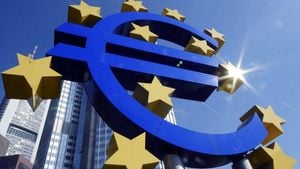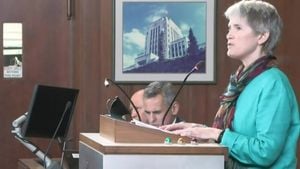Indonesian President Prabowo Subianto has embarked on his first official state visit to the United States since assuming office, aiming to strengthen ties with Washington amid shifting geopolitical landscapes. This visit follows closely on the heels of his inaugural overseas trip to China, where he met with President Xi Jinping, marking Prabowo's proactive approach to diplomacy. Arriving at Andrews Air Force Base on November 10, 2024, he was set to engage with various US officials, including discussions with President Joe Biden scheduled for November 12.
During his visit, Prabowo expressed his commitment to enhancing the Indonesian-US relationship, emphasizing the potential for cooperation. "I will work very hard to strengthen the Indonesian-United States relationship, and I would like to work toward this end so we can have strong cooperation," he declared during his meeting with Biden. This time of engagement signals Prabowo's intent to reaffirm Indonesia's position as a significant player in Southeast Asia, particularly against the backdrop of its non-aligned stance during increasing US-China tensions.
On the eve of his meeting with Biden, Prabowo made headlines with a phone call to President-elect Donald Trump, extending his congratulations and expressing his willingness to visit Florida to meet Trump personally. "Wherever you are, I’m willing to fly to congratulate you personally, sir," Prabowo stated. Trump reciprocated the sentiments, describing the Indonesian leader as "very respected" and praising his English—thanks to his military training, as Prabowo noted, which was influenced substantially by American methods.
The meetings come at a time when Indonesia, the world’s most populous Muslim-majority country, finds itself at the center of international focus. Washington views Jakarta as pivotal, especially as it navigates its relationships with partners like China, which is invested heavily across the region. While China remains Indonesia's key economic ally, the Southeast Asian nation is also transitioning to be a more significant buyer of US arms and aims to increase exports of its natural resources to Western markets.
At the White House, discussions expanded beyond the traditional military alliances and economic investments, touching on pressing issues like climate change, regional stability, and the South China Sea. Notably, Indonesia reiterated its refusal to recognize China’s extensive claims over this contested maritime region, which underlines its commitment to uphold international maritime laws. This stance may improve Indonesia's credibility with the US, particularly as tensions continue to rise between Beijing and Washington.
After the initial meetings concluded, Prabowo participated in dialogues with representatives from major US corporations, including Freeport-McMoRan and Chevron. At this gathering supported by the US-Indonesia Society, the Indonesian leader encouraged American firms to invest and engage more actively with Indonesia’s development plans. Given the historical difficulties businesses have faced under the previous administration, Prabowo asserted the importance of fostering transparency, enhancing human resources, and improving policymaking as pillars of his administration's economic framework.
While the engagements with Biden attracted considerable attention, analysts noted the significance of his outreach to Trump, especially concerning future cooperation and alignment of policies between the two nations. Experts like Yose Rizal Damuri from the Center for Strategic and International Studies stressed, "Of course, the relationship between countries should take more importance than personal relationships, but Trump’s victory may cast completely different backgrounds to the US compared with Biden. All this does not elude Prabowo.”
Prabowo’s strategic maneuvers reflect a multifaceted diplomatic approach aimed at balancing Indonesia's relationships with both polarized global powers. By courting both sides, he seeks not only immediate cooperation but also long-term sustainable partnerships. Yet, challenges persist, particularly the urgent need for Jakarta to appoint a new ambassador to the US. The post has remained vacant for over a year, which analysts argue could hinder Indonesia's engagement strategy if not filled soon.
Moving forward, achieving deepened ties with the US will require consistency and dedication from Prabowo's administration. The overwhelming focus of this visit is not merely transactional but aims for meaningful collaboration on issues of global importance. The roads to successful diplomatic relations are complex; nevertheless, Prabowo’s willingness to engage with Washington signifies his intentions to position Indonesia as both a partner and a leader within the dynamic landscapes of international diplomacy. This commitment must now translate to actionable policies and consistent dialogue aimed at fostering mutual interests and respect.



